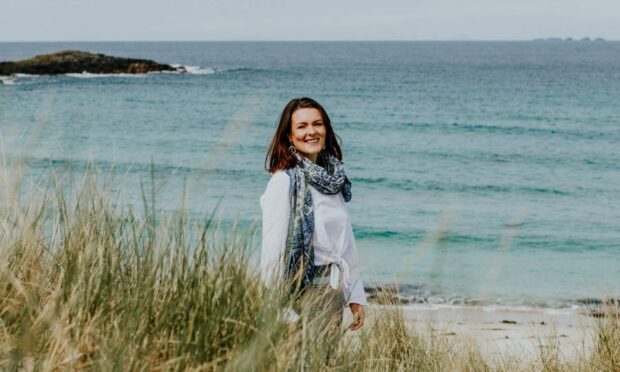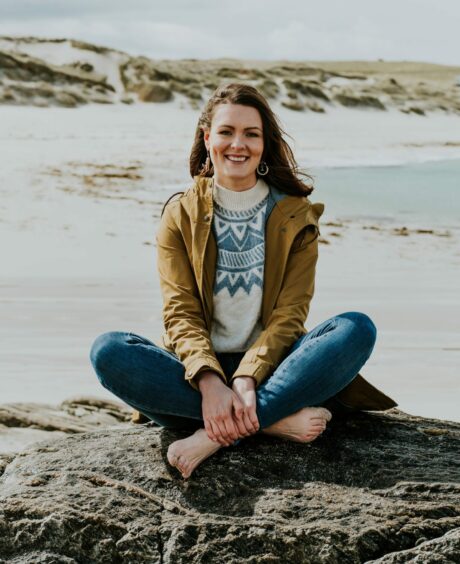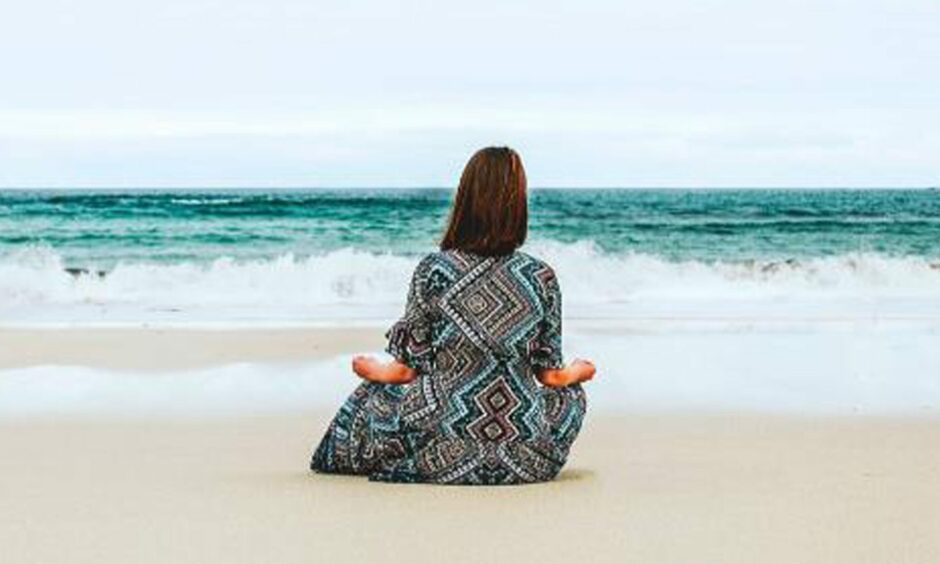After rediscovering the joy of Uist life, Shona Currie is setting out to help others “connect back to community”.
There’s no doubt that depopulation is one of the biggest challenges the Western Isles are facing today. But people leaving isn’t the whole story – and some versions can make the islands sound like a ghost town rather than the vibrant community it is. In this article, and others, we shine a light on some of the many different people who are choosing to build a life in the Outer Hebrides.
Shona Currie was born and brought up in the Outer Hebrides.
She now describes her childhood as “idyllic”. But, she says, “by the time I got to my teens, I was ready to leave.”
‘I never thought I would return’
Eager to experience life in the mainland’s biggest cities, she left at sixteen and ended up in London.
“I never thought I would return.”
But after over a decade of travelling, Uist began to call her home. Now, she has a growing business and family on the island she once couldn’t wait to leave.
In her twenties, she “started to get more homesick,” she says.
She feels that “it took me leaving the islands to really appreciate what I had”.
“I loved my life in London. I loved the bright lights, the big city, the convenience of it.”
But, even then, visiting home was important to her. And, she says, “I felt like I could reset every time I came home.”
‘We’re all interwoven into the fabric of the island’
It was a sense of peace completely unlike the busy city life. And, as the years went on, she says that “the draw to come home got stronger and stronger to the point that I couldn’t ignore it anymore”.
“Everything that I needed in this life to be happy, I realised I already had in my roots.”
A big part of that is the strong community in Uist, she says.
“Everyone knows each other. We’re all interwoven into the fabric of the island, and I love that we feel so connected.”
As well as the people, she feels drawn to the land itself.
“I just love the ruggedness and the wildness,” she says. “The pristine white beaches as far as I can see, the turquoise seas.”
“I just want to feel connected with nature.”
‘Nature supports well-being’
The unique landscape of the Outer Hebrides is also central to Ms Currie’s work as a therapist trained in hypnotherapy and cognitive behavioural therapy (CBT).
“Lots of research shows us that nature supports well-being,” she says. “You only have to go for a walk outside and it’s indisputable that it lifts our mood.”
Having dedicated her life to helping others improve their mental health, she had a realisation: “I want to do it here.”
And it’s not just about bringing her unique skills to Uist – it’s about bringing Uist’s unique qualities to anyone who needs them.
Her “dream” is to have her own “retreat centre and sustainable tourism business so that people can come up here and they can have that break”.
“They can connect back to themselves, back to nature, back to community.”
She has already joined forces with yoga teacher Kerry McColl to offer an ‘Immersive Island Retreat’ in July 2023.
Ms Currie believes that the unique beauty and community of Uist will keep people deciding to make a life here – whether they’re Uist-born or incomers.
Since moving back, she says she’s been “so pleasantly surprised” to see “lots of business startups”, including “loads of new incomers coming in and setting up fantastic businesses and creative industries”.
It’s important, she says, for there to be “sustained interventions to keep the momentum up” in combating Uist’s depopulation.
“That’s investing in positive outcomes.”
Recently, her sister has secured a full-time post as the islands “settlement officer”, a move Ms Currie says is “brilliant”.
“That shows that there’s more recognition of the deep-rooted problems around transport, depopulation, and the aging population.”
‘Solutions-focused’
She says that these problems are not only getting more attention; the attitude around them is changing, too.
“Before, I felt like it was quite problems-focused, but now it’s very much solutions-focused.”
In order to keep people joining Uist’s community, she says it’s important to make it clear that things aren’t “all doom and gloom”.
“If people only knew about the creative opportunities that are here, and the quality of life,” even more people would choose to make a life in the Hebrides, she says.
Of course, there are downsides.
Ms Currie says she does “really miss” the plentiful cinemas and coffee shops of London and Edinburgh.
‘I see my future here’
However, for her, she has realised that what she misses is “all the short-term gratification stuff”.
“Living here is so aligned with my values, and with my long-term goals of what I want in this life.”
“That’s why I see my future here.”
And she doesn’t just see that future for herself.
“A big draw to coming back here was also starting a family,” she says.
Now she has a son, and she hopes that “with him growing up here that he’ll have that same sense of belonging”.
“I know he will, actually. I just know he will.”
More local reporting from the Western Isles:



Conversation